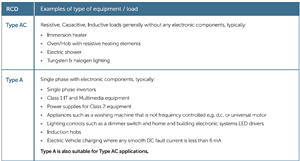jcm:
EICR ,how do you know what type of RCD is fitted if not stated , I have one or two spare no markings as to what type they are. Can we give a code for that.
Now even 13amp socket outlets with one or two USB type A charging points are out of date , you now need sockets with USB charging points Type C . You can buy outlets with one Type C and one type A, witch covers both charging leads ,but of course more money and bother for customer to change existing ones.
The whole regulations are getting out of hand.
jcm
RCDs with no markings would normally be Type AC, and manufactured before RCD Types were introduced in the standards.
If the RCD is newer than that, then I don't believe it complies with no markings.
The RCD markings are:
| IEC 60417 Symbol |
| Type AC |
 |
| Type A |
 |
| Type F |
 |
| Type B |
 or  or  |
davezawadi (David Stone):
I don't think that is quite right Graham because a number of older models use a single thyristor, and provide the motor with half-wave rectified DC. This is fine for a universal motor, provides speed control, etc, but could give "DC" faults.
Hi David, yes, I remember those washing machines that could vary half speed to full speed - early '70's.
You'd have a job to put those on a circuit with other appliances, supplied by 30 mA RCD, because the noise filters were 10 mA leakage. True story about this type of machine ... the one we had when I was a kid, was connected to a socket-outlet behind the machine. Over time, the earth pin on the plug became corroded due to humidity in the kitchen, so the "leakage" couldn't go anywhere. The way we found out about that, was hearing my Mum scream - she had stripped off late one night and put her clothes in the machine, bent over to pick up something else, and got a nasty belt from behind - due to the large protective conductor current available at the [not very well earthed] machine ... | OUCH !

Sparkingchip:
I went to an installation where the Bosch washing machine and another where the Bosch hob were knocking the RCDs out.
Now you are questioning the RCD requirements for a Worcester Bosch boiler.
There's something in common with each of those appliances.
?
Sparkingchip:
I went to an installation where the Bosch washing machine and another where the Bosch hob were knocking the RCDs out.
Now you are questioning the RCD requirements for a Worcester Bosch boiler.
There's something in common with each of those appliances.
And it's neither bish nor bash ... ?
We're about to take you to the IET registration website. Don't worry though, you'll be sent straight back to the community after completing the registration.
Continue to the IET registration site